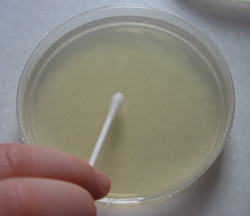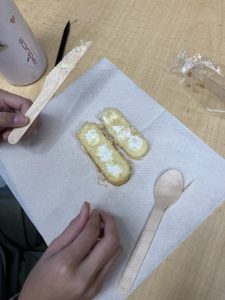Today, our class began collecting ‘samples’ from around the school in order to grow our own mystery microorganisms! We used a cotton swab to carefully collect a sample (from the bottom of our shoe, from our pencil, from the floor, from a doorknob, and other places). Then, we rubbed the cotton swab onto the agar gel in our mini petri-dishes. Ms. Ward made the agar from a few household ingredients. If you want to try this experiment at home, you can use this recipe:

Agar Recipe (for collecting and growing microorganisms)
- 5 packets of unflavoured gelatin
- 10 teaspoons of white sugar
- 1 packet or 1 cube of chicken or beef bouillon
- 5 cups of boiling water
Carefully mix together the gelatin, sugar, and bouillon. Add the boiling water and mix well. Put in the fridge to cool for around 10 minutes, until just slightly warm. Then, carefully pour into your petri dishes and refrigerate until needed. Use within 2 days for the best results.
To use: carefully collect a sample using a damp cotton swab. Try to pick somewhere you think will likely have lots of microorganisms! Then, rub the q-tip onto the agar, seal the petri dish, and leave in a warm, dark place for a few days. For safety reasons, do NOT open the petri dish once the microorganisms begin to grow. Observe them, then throw the entire experiment in the garbage.
Note: We talked extensively about ensuring that we do not contaminate our agar. Ms. Ward even discovered that one of her spoons hadn’t been sterilized properly, and it contaminated a few of our petri dishes. If you want accurate results, make sure to sterilize all of your equipment beforehand, and wash your hands!
We will let our microorganisms incubate over the weekend, then check to see our results on Monday. Stay tuned for pictures and updates!


